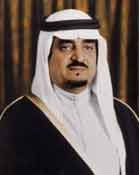King Fahd bin Abdul Aziz
(1921 - 2005)

King Fahd bin Abdul Aziz died on August 1, 2005. He had served as the king and prime minister of Saudi Arabia, and leader of the House of Saud. Fahd suffered a major stroke in 1996, and was subsequently unable to perform his official duties; his half-brother, Crown Prince Abdullah, served as de facto regent of the kingdom.
Fahd was a son of Ibn Saud, the first monarch and founder of modern Saudi Arabia. At the time of his birth, Fahd's father was completing the consolidation of the House of Saud's power on the Arabian Peninsula and the founding of Saudi Arabia.
At the age of eleven, in 1932, Fahd watched as his father officially founded the Kingdom of Saudi Arabia by signing the Treaty of Jedda.
Fahd's education took place at the Princes' School in Riyadh, a school established by Ibn Saud specifically for the education of members of the House of Saud. While studying at the Princes' School Fahd studied under tutors including Sheikh Abdul-Ghani Khayat. Following his education at the Princes' School, Fahd moved on to the Religious Knowledge Institute in Mecca, where he studied Wahhabi Islam.
In 1945, Fahd travelled on his first state visit to New York, New York to attend the opening session of the General Assembly of the United Nations. On this trip, Fahd served under his brother, King Faisal who was at the time Saudi Arabia's foreign minister.
In 1953, at the age of thirty, Fahd was appointed Education Minister by his father. Also in 1953, Fahd led his first official state visit, attending the coronation of Queen Elizabeth II on behalf of the House of Saud.
Later Fahd would lead the Saudi delegation to the League of Arab States in 1959, signifying his growing relevance and importance in the House of Saud — and his being groomed for more significant power.
Finally, in 1962, Fahd was given a post of prodigious responsibility, that of Interior Minister. Five years later, Fahd would be appointed Second Deputy Prime Minister, a significant post in the House of Saud.
King Fahd has given money for building mosques throughout the world. One of these mosques is the Ibrahim-Al-Ibrahim Mosque, at Europa Point, Gibraltar,which opened in 1997.On March 25, 1975, King Faisal died and King Khalid assumed power. Fahd, as next in the line of succession, become Crown Prince and First Deputy Prime Minister. Especially in the later years of King Khalid's reign, Fahd was viewed as the de facto prime minister.
When King Khalid passed away on June 13, 1982, Fahd succeeded to the throne.
Since his stroke, King Fahd has been mostly inactive, though he still attends meetings and receives selected visitors. In November 2003, he pledged to "strike with an iron fist" at terrorists after a deadly bombing. However, it is Crown Prince Abdullah who takes official trips; when King Fahd travels it is for vacations, and he is sometimes absent from Saudi Arabia for months at a time. When his oldest son and International Olympic Committee member Prince Faisal bin Fahd, died in 1999, the King was in Spain and did not return for the funeral.
King Fahd is the oldest of the "Sudairi Seven", the seven sons of King Abdul Aziz "ibn Saud" by Hassa bint Ahmad Sudairi who have been close to one another all their lives. Among his full brothers, Prince Sultan bin Abdul Aziz (born 1927) has been Minister of Defense since 1962 and Second Deputy Prime Minister since 1982, and is considered likely to be the next Crown Prince. Prince Nayef bin Abdul Aziz, who succeeded King Fahd as Interior Minister in 1975, and Prince Salman bin Abdul Aziz, the Governor of Riyadh, are also considered potential future Kings among the Seven.
Sources: Wikipedia; This article is available under the terms of the GNU Free Documentation License


